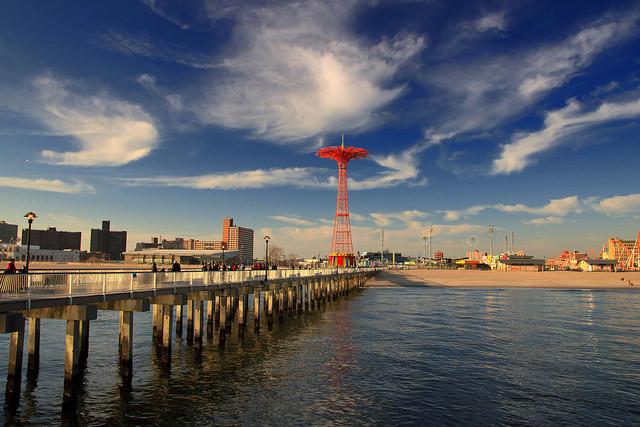
I stepped out of the doctor’s office and felt confused.
Or not confused so much as stunned,
and not because she said I was heading straight for death,
which I was already well aware of, and which she knew I knew,
making her telling me anyways irksome, like getting served a drink
that looks like your drink but is the wrong drink, you’re nearly certain of it,
but not completely, so you keep drinking it, knowing it isn’t yours,
each sip further confirming this fact, and this is what you get
for not trusting your instincts, you think, you deserve
to drink this drink that is not what you wanted,
not what you would ever want,
but it’s her job, I guess.
Nor was it that she said I’d punished my body like some flesh and blood Coney Island,
but that as I began to walk I could feel that place,
though I’d never been there, opening within me—
waves filmed with zinc lapping at the beach, needles and cigarette butts in the sand,
the boardwalk coming to life under the flashing bulbs,
32oz beers foaming over tin trays of littlenecks,
screams of people getting scared
the way they’d paid for—and this went on for what felt like hours,
my walking, until I found myself
in the part of town where the streets are named for New England colleges
none of the residents had ever known, before a house that,
when I looked up at it, did not look back, the very absence of its returned glance
what alerted me to its initial possibility,
and as I stood regarding it
there rose in me such a clear urge to enter
that I began to envision myself walking to the door,
flagstones tilting under my weight,
the brass doorknob cool in my hand—
This was a mistake,
I thought, watching the fantasy of myself walking through the door,
confronting a great sorrow, the other side of which I am now willing to say is loneliness,
which I’d never said before for fear that once it’s acknowledged
it can never be undone, but between these currents, between
the rooms, I sensed an intimacy shared with me and the things left behind,
that in their being forgotten they’d become heightened versions of themselves,
and I understood that once something belongs to someone
it retains that need,
the toaster of Mr. X now a toaster alone in the world.
After weeks of this I understood that the earlier episode of North Atlantic fantasy
was in fact an experience of compression so intense that I felt like a car
smashed and baled with other smashed cars stacked on bales of smashed cars.
But now this, this was really something:
with each hour spent in the fantasy,
with each new room I entered and came to know,
there was also the sense of expansion within myself,
I stopped seeing my body as a system of boundaries and more
a frame through which to experience this opening,
not unlike the windows in the rooms themselves—
I could feel a sky below my collarbones.
Through the steam in the bathroom mirror
I smeared a halo over my head.
I considered my teeth,
truly accounting for how much each one does for me,
thankful for the ones that stuck around, forgiving
those that left. But then one afternoon
while envisioning myself pulling again and again on a string
that switched on the lightbulb in the pantry,
the house underwent a kind of sea-change
that moved through the rooms like the smell of a dead rat in the wall,
unpleasant at first, but then nagging, immediate,
there was a fear inside it that I had once known but could not place from when,
until I remembered—it was the nagging—a Sunday
years ago: my niece, not even two at the time, was tugging
on her mother’s pant leg, staring at me ferociously
as if she could sense a herd of buffalo was about to storm through the wall,
and then suddenly her face leaked out a stream of vomit
the white of milk and new guts,
the white of headlights turned up at the scene of an accident
burning off into the thin parts of night,
her eyes crossed as she watched it dribble out.
Because you never will remember this, I’d whispered to my crying niece,
you never will forget it.
William Brewer is the author of I Know Your Kind (Milkweed Editions, forthcoming 2017), winner of the National Poetry Series, and Oxyana, selected for the Poetry Society of America's 30 and Under Chapbook Fellowship. His poetry has appeared in Boston Review, Kenyon Review Online, Narrative (where it was awarded the 30 Below Prize), The Nation, A Public Space, and other journals. Currently a Wallace Stegner Poetry Fellow at Stanford University, he was born and raised in West Virginia.
Photo by simplethrill
